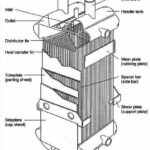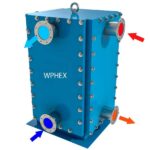Miller equation also known as Benjamin Miller equation is mainly used to calculate the pressure drop due to friction in crude oil pipelines. The equation is different that other equations as it doesn’t take into account the pipe roughness.
Calculating the pressure drop with Miller equation usually requires trial and error as will be seen later with an example.
Miller equation in US Units
The equation can written as shown below:
\[P\ =\ \left(\frac{Q}{4.06M}\right)^2\left(\frac{Sg}{D^5}\right)\]
\[M\ =\ Log_{10}\left(\frac{D^3\ Sg\ P}{u^2}\right)+4.35\]
Where; P = Frictional pressure drop, psi/mile Q = Flow rate, bbl/day D = Pipe internal diameter, in Sg = Liquid specific gravity u = Liquid viscosity, cP
And in terms of flow rate the equation can be written as below;
\[Q\ =\ 4.06\ M\ \left(\frac{D^5P}{Sg}\right)^{0.5}\]
Miller Equation in SI Units
The equation can written as shown below:
\[P\ =\ \left(\frac{Q}{3.996\cdot10^{_{-6}}M}\right)^2\left(\frac{Sg}{D^5}\right)\]
\[M\ =\ Log_{10}\left(\frac{D^3\ Sg\ P}{u^2}\right)-0.4965\]
Where; P = Frictional pressure drop, kPa/km Q = Flow rate, m3/hr D = Pipe internal diameter, mm Sg = Liquid specific gravity u = Liquid viscosity, cP
And in terms of flow rate the equation can be written as below;
\[Q\ =3.996\cdot10^{_{-6}}\ M\ \left(\frac{D^5\ P}{Sg}\right)^{0.5}\]
Example
Crude oil with a temperature of 60’F and a specific gravity of 0.825 is flowing at a rate of 5000 gal/min. The viscosity of this oil is 12.375 cP. Calculate the pressure drop in a 15 in pipe with a wall thickness of 0.25 in.
Solution
Step 1: Guess a pressure value, P = 25psi/mile
Step 2: Calculate the M parameter
\[M\ =\ Log_{10}\left(\frac{14.5^3\ \cdot\ 0.825\ \cdot\ 25}{12.375^2}\right)+4.35\]
M = 6.963
Step 3: Use the calculated value to calculate P
\[P\ =\ \left(\frac{5000\cdot34.2857}{4.06\cdot6.963}\right)^2\left(\frac{0.825}{14.5^5}\right)\]
P = 47.33 psi/mile
Values of P didn’t converge, use the last value of P to calculate M, M = 7.241
Calculating P = 43.765 psi/mil
by successive iterations final value of around P = 44.139 psi/mile
References
E. Shashi Menon, Liquid Pipeline Hydraulics, Marcel Dekker, Inc. 2004
Useful software
Process engineering calculator by webbusterz engineering











